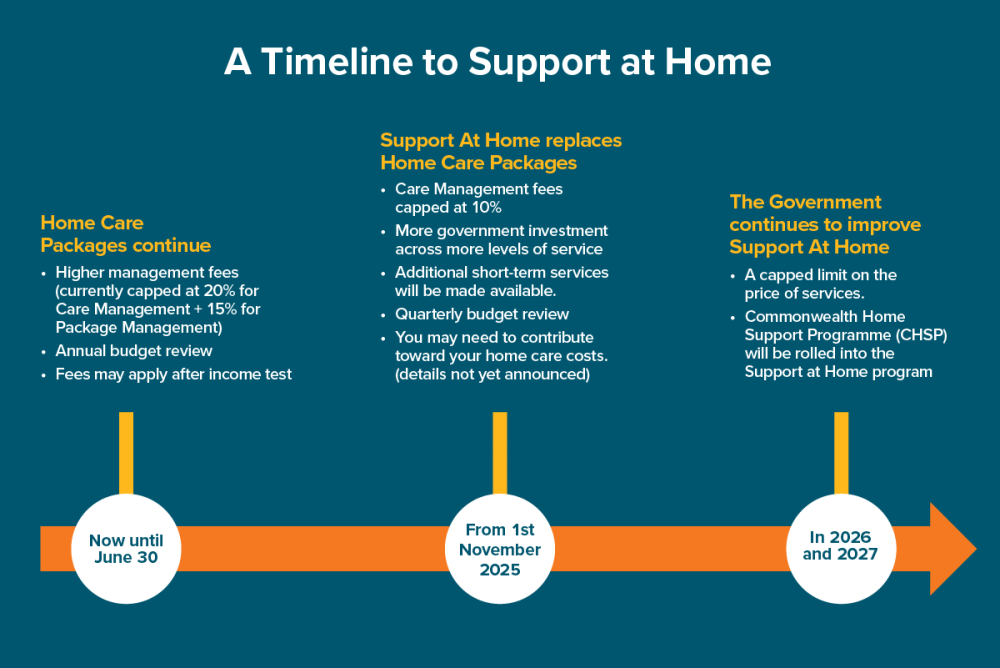The role of home care package providers in long-term disability care planning
The role of home care package providers in long-term disability care planning
Blog Article
The Relevance of Home Care in Handicap Support: Discovering NDIS Registered Solutions
Home care is an essential aspect of handicap support, specifically within the framework of NDIS registered services. It provides vital solutions that cultivate independence and improve general lifestyle for individuals with impairments. By providing customized aid, these services accommodate special demands and choices. Nonetheless, the effectiveness of home treatment depends on ongoing interaction with NDIS organizers. This dynamic partnership exposes much deeper insights right into the transformative capacity of customized assistance. What obstacles and successes emerge in this evolving landscape?
Comprehending the Duty of Home Care in Impairment Assistance
Home treatment plays a vital role in the assistance of individuals with disabilities, giving considerable services that advertise self-reliance and boost lifestyle. It includes a series of assistance tailored to fulfill the special requirements of each individual, consisting of individual treatment, household tasks, and mobility support. Educated caretakers provide companionship and emotional assistance, fostering purposeful links that combat social isolation.Furthermore, home treatment services are created to adapt as scenarios alter, ensuring that individuals obtain the proper degree of treatment throughout their lives. This flexibility permits the integration of new treatments or innovations that might develop. By focusing on the individual's choices and regimens, home care encourages them to keep control over their everyday tasks. Inevitably, the function of home treatment in impairment support is necessary, as it not only supplies sensible support however additionally affirms the self-respect and autonomy of those it serves.

Advantages of Personalized Assistance in the house
Individualized support in the house offers countless advantages tailored to individual demands - support at home. By developing customized support strategies, caretakers can greatly boost the independence of individuals with handicaps. This strategy not just promotes freedom but also promotes a sense of dignity and self-respect
Tailored Assistance Strategies
Customized support strategies play a vital duty in boosting the lifestyle for people with impairments. These tailored plans are made to resolve the distinct demands and choices of each person, making sure that support solutions align with their particular objectives and way of life. By entailing customers in the preparation process, tailored assistance strategies promote a sense of possession and empowerment. This customized strategy allows caregivers to offer pertinent assistance, whether it includes daily living activities, social interaction, or ability growth. Additionally, customized strategies can adjust to changing scenarios, mirroring the progressing demands of the person. Eventually, this individualized support improves not only daily functioning yet also emotional health, enhancing the value of a customized strategy in disability support solutions.
Improved Freedom Opportunities
People with handicaps profit significantly from individualized help in the house, as it advertises enhanced self-reliance possibilities. Customized support enables people to engage in daily tasks with greater self-confidence and autonomy. Home care services can include aid with individual treatment, dish preparation, and family administration, enabling clients to preserve their routines and choices. This customized approach cultivates a feeling of control, equipping individuals to choose that reflect their one-of-a-kind demands and goals. In addition, the comfort of home creates a familiar setting, lowering stress and anxiety and boosting psychological well-being. Generally, tailored help not just sustains vital daily tasks however likewise grows a more independent way of living, allowing people with disabilities to flourish within their communities and accomplish better personal fulfillment.
Introduction of NDIS Registered Home Care Services
NDIS registered home care services encompass numerous kinds of assistance customized to individuals with disabilities (home care providers melbourne). Understanding eligibility and access to these solutions is important for optimizing the advantages of NDIS support. This introduction will certainly highlight the essential facets of home treatment under the NDIS framework
Kinds of Home Treatment
Home treatment solutions play a vital function in supporting people with specials needs, providing a series of options to fulfill varied requirements. NDIS signed up home treatment solutions consist of personal care, which helps individuals with day-to-day tasks like bathing and dressing. Residential help assists preserve a tidy and secure living atmosphere, while respite treatment offers short-term alleviation for key caregivers. Community gain access to solutions allow engagement in entertainment and social tasks, fostering freedom and link. In addition, nursing treatment provides medical assistance in your home, making sure wellness needs are satisfied. Therapy solutions, including work and physiotherapy, aid in recovery and ability growth. Together, these numerous types of home treatment add significantly to boosting the high quality of life for individuals with handicaps.
Eligibility and Accessibility
How can one access the vital home treatment solutions offered under the NDIS? To certify for these services, people have to fulfill certain qualification standards laid out by the National Handicap Insurance Coverage Scheme. Candidates need to show a considerable and irreversible disability that influences their daily performance. The process begins with sending an Access Request Type, which includes documentation of the disability Going Here and its influence on day-to-day live. When approved, people get a personalized plan outlining their called for supports, consisting of home treatment solutions. These solutions can be accessed through NDIS-registered suppliers, who should comply with rigorous high quality and security requirements. Comprehending these steps warranties individuals can successfully navigate the NDIS system to obtain the necessary support for their home treatment needs.
Advantages of NDIS Assistance
Accessing essential support via registered services provides individuals with disabilities a transformative opportunity to enhance their top quality of life. NDIS registered home care services supply customized help, ensuring that each individual's distinct needs are met. These services incorporate a wide array of supports, including personal treatment, mobility help, and healing services, all developed to advertise self-reliance and health. Additionally, registered service providers stick to extensive top quality requirements, ensuring a high level of treatment and security. Participants also gain from enhanced versatility, allowing them to pick solution shipment approaches that best match their way of lives. Ultimately, NDIS support fosters a feeling of neighborhood and empowerment, allowing people with impairments to involve even more fully in their every day lives and achieve individual objectives.
Tailoring support to private demands is vital in special needs care, as everyone's preferences and scenarios differ significantly. The National Disability Insurance Policy System (NDIS) highlights the importance of customized treatment plans that mirror the special goals and requirements of each individual. This method allows caregivers to concentrate on details locations such as wheelchair assistance, daily living skills, and emotional support, making sure that solutions are efficient and pertinent.
Enhancing High Quality of Life Through Home Treatment
While several individuals with disabilities face special obstacles, home care services can greatly boost their quality of life by providing customized assistance in familiar surroundings. These solutions foster freedom, permitting people to engage in everyday tasks that promote self-esteem and personal satisfaction. Via personalized treatment strategies, home treatment service providers can resolve particular requirements, whether it entails support with personal health, dish prep work, or drug management.Moreover, home treatment assists in social communications, motivating connections with family members and pals, which are crucial for psychological well-being. By continuing to be in their own homes, individuals experience a feeling of stability and continuity, decreasing stress and anxiety associated with unfamiliar atmospheres. Additionally, caretakers can use friendship, assisting to reduce feelings of isolation. On the whole, home treatment not only addresses physical needs however additionally enhances the social and emotional dimensions of life for individuals with impairments, ultimately resulting in an extra meeting and enjoyable existence.
Navigating the NDIS for Home Care Solutions
Assisting via the National Disability Insurance Coverage Plan (NDIS) can significantly affect the performance of home care services for people with disabilities. Understanding the NDIS framework is essential for participants looking for suitable funding for home care services. This procedure begins with recognizing private needs and goals, which helps in tailoring support strategies that straighten with the individual's requirements.Navigating the NDIS involves familiarizing oneself with the eligibility standards, application treatments, and the planning process. Individuals have to involve with NDIS coordinators to review their particular scenarios and desired outcomes. This discussion ensures that the Learn More required home care services, such as individual care, help with day-to-day living, and healing assistance, are included in their plans.Furthermore, staying upgraded on NDIS plans and any type of modifications in funding can encourage individuals to make informed options concerning their home treatment choices, inevitably boosting their independence and high quality of life.
Success Stories: Empowering Lives Through Home Care
Home treatment solutions have transformed the lives of several people with specials needs, showing the extensive impact of personalized support. For example, Sarah, a girl with cerebral palsy, gained self-reliance via customized home care help that enabled her to participate and take care of daily tasks in area activities. Likewise, John, that has autism, benefited from a devoted caretaker that helped him create social abilities and foster significant connections, enhancing his top you could try these out quality of life. These success stories highlight exactly how home care not only meets physical needs but also promotes emotional wellness. Family members report boosted comfort, recognizing their liked ones receive compassionate and professional support in an acquainted environment. As these examples illustrate, home treatment equips people with impairments to prosper, urging self-sufficiency and boosting general life fulfillment. The transformative effects of such services emphasize the value of home treatment in the broader context of special needs support.

Regularly Asked Concerns
Just How Can I Locate NDIS Registered Home Care Providers in My Area?
To find NDIS signed up home treatment service providers in a certain area, people can go to the NDIS web site, use the copyright finder device, or contact regional handicap assistance organizations for recommendations and assistance.
What Credentials Should Home Treatment Employees Possess for Handicap Support?
Home care workers for disability support must ideally possess qualifications such as a Certificate III in Individual Support, appropriate experience, solid interaction abilities, compassion, and understanding of impairment civil liberties and person-centered treatment practices.
Exist Any Kind Of Expenses Related To NDIS Registered Home Treatment Services?
Expenses connected with NDIS signed up home care solutions can differ based on individual needs, company, and the level of care needed. Individuals must evaluate their strategies to understand particular funding and prospective out-of-pocket expenses.
Can Home Treatment Services Accommodate Particular Social or Language Requirements?

Just How Frequently Can I Change My Home Treatment Support Strategy?
People can normally change their home treatment support strategy as required, commonly at the very least annually or upon considerable life changes. Regular testimonials assure that the strategy continues to be appropriate and properly addresses evolving personal scenarios and demands. Educated caretakers supply friendship and emotional assistance, cultivating significant connections that combat social isolation.Furthermore, home care services are created to adjust as scenarios change, making sure that people receive the appropriate degree of care throughout their lives. Home treatment solutions can consist of assistance with personal treatment, meal preparation, and home administration, allowing clients to preserve their regimens and choices. NDIS signed up home treatment solutions consist of individual treatment, which assists people with day-to-day activities like showering and clothing. With customized treatment plans, home treatment carriers can resolve details demands, whether it entails help with personal hygiene, dish preparation, or medication management.Moreover, home treatment assists in social interactions, urging links with family members and buddies, which are important for emotional well-being. Expenses connected with NDIS signed up home treatment solutions can vary based on private demands, solution carriers, and the degree of treatment required.
Report this page